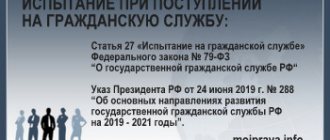The probationary period gives the employee the opportunity to ensure that the company suits his requirements, and his employer has the opportunity to understand the level of competence of the employee. Sometimes people leave because they themselves have such a desire. Often the employer himself can fire you. Few people know what kind of compensation payments are due to an employee dismissed from a probationary period. Need to find out.
Reasons for dismissal from probation
Dismissal during the probationary period may occur if the employee:
- does not correspond to the position he occupies;
- is unable to perform his duties due to health problems;
- is regularly late or does not come to work at all;
- violates the internal regulations of the organization;
- does not comply with safety requirements.
It should also be noted that pregnant women and mothers of children under the age of one and a half years, minor workers, employees with fixed-term employment contracts, persons who passed the competition and transferred from another company, as well as university graduates cannot be dismissed from the probationary period. These persons are not tested for professional suitability - they are not hired for a probationary period.
For management personnel, the reason for dismissal may be:
- replacement of the owner of the enterprise;
- an unjustified decision that led to material damage to the institution;
- gross violation of official duties.
Can an employee be fired after this period, is it possible to challenge the decision?
The head of an enterprise, concluding an employment agreement with a new employee, has the right to include in it a clause on a probationary period, during which the qualifications and ability of the newly hired subordinate to perform the official duties assigned to him will be assessed.
At the end of the test period, the head of the enterprise makes one of the following decisions:
- recognizes the test result as unsatisfactory and, in connection with this, terminates official legal relations with the subordinate;
- recognizes the employee as having completed the test.
Article 77 of the Labor Code of the Russian Federation classifies dismissal due to failure to pass the test as termination of official legal relations at the initiative of the employer (Part 1 of Article 71 of the Labor Code of the Russian Federation).
Termination of an employment contract on the above grounds is possible at any time before the end of the probationary period established by agreement between the employer and the subordinate. It should be borne in mind that termination of an employment agreement can be initiated by:
- employer who has decided that the employee is not suitable for him for some reason (in this case, failure to pass the test, part 1 of Article 71 of the Labor Code of the Russian Federation will serve as the basis for termination of the official relationship);
- a subordinate who has come to the conclusion that the work does not suit him (in this case, the basis for dismissal will be the employee’s initiative, paragraph 3 of part 1 of Article 77 of the Labor Code of the Russian Federation, Article 80 of the Labor Code).
The party initiating the termination of the official legal relationship is obliged to notify the other party of its decision in writing no later than 3 days in advance.
If the probationary period has ended, and the subordinate continued to perform his job duties, then he is considered to have passed the test, and in the future his dismissal can be carried out on a general basis. Termination of legal relations due to the fact that he did not pass the test cannot be applied to him.
This is important to know: The procedure for dismissing a serviceman from military service
Features of settlement with a dismissed employee
Additional Information
You can read about dismissal due to failure to complete the probationary period here.
Art. 70 of the Labor Code of the Russian Federation contains provisions according to which an employee on a probationary period has the right to receive monetary compensation upon dismissal. Compensation for dismissal during a probationary period contains the following components:
- Salary for hours worked. When a subject is dismissed, the employer forms a debt in the form of the balance of wages, which must be transferred on the day of dismissal.
- Payment for unused vacation. Compensation is paid regardless of the grounds for dismissal of the employee. If an employee has worked for a company for less than 11 months, he is entitled to receive proportional compensation for unused vacation days (2.33 days per month).
- Severance pay. This payment is guaranteed if the termination of the employment contract occurs at the initiative of the management. Payments are also due in case of downsizing and liquidation of a company.
Compensation is not due to those employees who worked on a probationary period for less than 14 days, as well as to persons who were executors under civil contracts (according to Article 11 of the Labor Code of the Russian Federation).
The video explains what to do in case of non-payment of wages and settlements
Dismissal procedure
Expert opinion
Lebedev Sergey Fedorovich
Practitioner lawyer with 7 years of experience. Specialization: civil law. Extensive experience in defense in court.
The correctness of the procedure for dismissing an employee during the probationary period or immediately after it is of great importance. Failure to comply with any point may become a reason for appealing dismissal in court.
This is important to know: Notice of dismissal due to liquidation
Let's consider the procedure for dismissal:
- the employer must send the dismissed employee a written notice of dismissal in 2 copies no later than 3 days before the end of the probationary period;
- the employee must read the notice and sign the employer’s copy. If the dismissed person does not want to accept the notice, then this fact must be recorded in a special act in the presence of 2 witnesses;
- further, the employer must issue an order to dismiss the employee, listing the facts that served as the reason for severing the employment relationship with him;
- The company’s accounting department must calculate it on the last day of the dismissed employee’s stay at work: issue wages for the time worked,
- issue compensation for unused vacation;
How is compensation calculated upon dismissal?
Some facts
When hiring a new employee, the company wants to insure against unreasonable overpayment of money. Thus, even the most reputable companies, during the trial, lower the salaries of employees by 15-40% relative to those indicated in the staffing table or paid to specialists who have been working in similar positions for a long time.
The calculation upon dismissal during the probationary period regarding the amount of compensation includes the calculation period for the average income account, the number of vacation days that the dismissed employee did not take, and the amount of average earnings.
To accurately calculate the compensation due for unused vacation, you need to multiply the employee’s average daily income by the number of vacation days for which monetary compensation is calculated. Payment of compensation required by law must be made on the day of dismissal in accordance with Art. 140 Labor Code of the Russian Federation.
The duration of the billing period in most cases is 12 months. It is customary to take the period from the 1st to the 30th (or 31st) day of the month inclusive as a calendar month. The amounts of payments paid include such items as wages, remunerations and bonuses, as well as additional payments related to the peculiarities of the working regime and working conditions. Social benefits are not taken into account.
Registration of the procedure
Before terminating an employment relationship with a subordinate due to failure to complete the probationary period, the employer must notify him of this 3 days in advance.
The warning must be in writing . This is only possible before the probationary period expires.
Like dismissal for other reasons, termination of legal relations between the parties due to the fact that during the probationary period the employee failed to fulfill the duties assigned to him, requires the employer to issue a dismissal order and make a corresponding entry in the subordinate’s work book. Article 84.1 of the Labor Code of the Russian Federation requires the employer, when making a dismissal entry in the work book, to strictly adhere to the wording contained in the code and other laws or regulations governing labor relations.
However, the head of the enterprise can meet the employee halfway and offer him dismissal, for example, at his own request.
In addition, part 4 of Article 71 of the Labor Code of the Russian Federation allows a subordinate to resign at his own request by notifying the head of the company in writing of his decision 3 days in advance.
In this case, the work record book and the order to terminate the employment agreement must contain the following wording: “Dismissed at his own request, part 3 of Article 77 of the Labor Code of the Russian Federation.”
What you need to know about compensation for the rest of your vacation
Duration of vacation under Art. 115 of the Labor Code of the Russian Federation is 28 calendar days. Depending on the organization, additional paid leave may appear, including for irregular working hours. The calculation for dismissal during the probationary period includes counting the vacation days for which payment is due. To get the desired value, you need to subtract the used vacation days from the earned vacation days.
An example of a calculation for an employment contract with a probationary period of three months: Suppose an employee worked for 56 calendar days, namely from July 1 to August 25. Wages accrued for days worked: in July 15,000 rubles. (RUB 15,000: 23 days x 23 days); in August 12,142.86 rubles. (RUB 15,000: 21 days x 17 days)
Number of calendar days in an incompletely worked month: in August 23.6 days (29.3: 31 days x 25). Average daily earnings are equal to: (15,000 rubles + 12,142.86 rubles): (29.3 days + 23.6 days) = 513.1 rubles.
The amount of compensation for unused vacation is: 513.1 rubles. x 4.66 days = 2165.28 rub.
How is an employee dismissed from his position?
An employee whose official relationship continued after the end of the probationary period is considered to have passed it; accordingly, in the future such an employee may be dismissed on the general grounds enshrined in the Labor Code of the Russian Federation:
- at the initiative of the employer (Article 81 of the Labor Code of the Russian Federation);
- by mutual consent of the subordinate and the employer (Article 78 of the Labor Code of the Russian Federation);
- at the initiative of the employee (Article 80 of the Labor Code of the Russian Federation).
At your own request
Labor legislation provides a subordinate with the opportunity to submit a resignation letter at any time of his own free will, having previously notified the employer of this. The difference between termination of an employment agreement during and after the end of the probationary period lies in the notice period given to the employer:
- in order to terminate the employment relationship on his own initiative during the probationary period, the subordinate must notify the employer in writing 3 days in advance;
- in the future, to terminate the employment agreement, it will be necessary to notify the employer 2 weeks in advance.
At the initiative of the employer
In accordance with Article 77 of the Labor Code of the Russian Federation, the dismissal of a subordinate who failed to cope with his job responsibilities during the probationary period is dismissal on the initiative of the employer.
In general, Article 81 of the Labor Code of the Russian Federation is devoted to the termination of official legal relations at the initiative of the employer. It includes both reasons for dismissal during the probationary period that are neutral for the reputation of a subordinate, as well as negative reasons for which the head of the company decides to terminate the employment agreement with the employee.
An employee on a probationary period is on a par with all other employees of the company, subject to internal regulations, local regulations in force at the enterprise, as well as labor legislation (Article 70 of the Labor Code of the Russian Federation).
Accordingly, if during the probationary period a subordinate commits a disciplinary offense, for example, absenteeism or appears at the workplace in a state of intoxication, the head of the enterprise has the right to dismiss him precisely on these grounds, enshrined in Article 81 of the Labor Code of the Russian Federation.
At the same time, he can meet with the employee and indicate Article 71 of the Labor Code of the Russian Federation as the basis for termination of official legal relations.
When is it better to quit - before or after the end of this period?
The employee has the right to terminate the official legal relationship with the employer, both before the end of the probationary period and after.
The main difference lies in the time frame within which it is necessary to notify the management of the enterprise about the upcoming dismissal:
- while on a probationary period, you must inform the employer 3 days in advance (the intricacies of dismissal during the probationary period and the work for this are described here);
- at the end of the probationary period, the period during which the head of the enterprise must be notified of dismissal increases to 2 weeks.
It should also be borne in mind that termination of an employment agreement at one's own request does not provide for the payment of any compensation or benefits; accordingly, the decision on the time of dismissal on this basis - during the test or after it - can be made solely by the employee himself.
However, if a person feels that he cannot cope with the performance of the duties assigned to him and, therefore, there is a possibility of termination of official legal relations with him in accordance with Article 71 of the Labor Code of the Russian Federation, then perhaps it is worth taking the initiative and writing a statement requesting dismissal on his own desire, so as not to spoil the work book with an entry with negative motivation.
Before the end of the probationary period provided for in the employment agreement, the head of the enterprise has the right to dismiss a subordinate as having failed the test . However, the employee himself, who believes that the job for one reason or another is not suitable for him, has the right to resign before the end of the established period at his own request.
If the probationary period provided for in the employment contract has ended, and there have been no complaints from the employer against the employee, and he has continued to perform his duties, then the use of Article 71 of the Labor Code of the Russian Federation as a basis for terminating labor relations becomes impossible.








